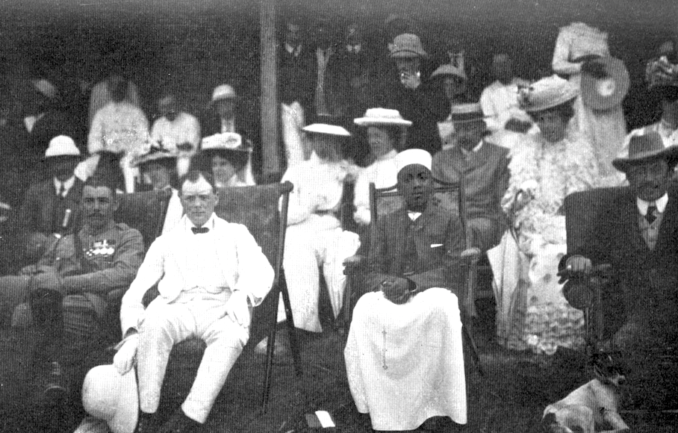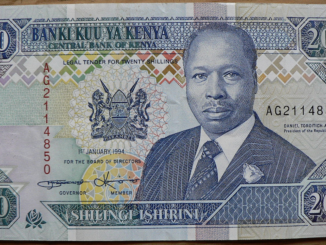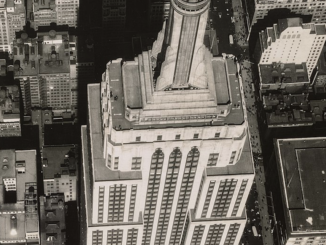On his way home from reporting on Kenya for the Birmingham Mail in 1955, my uncle John Alldridge filed this report from Uganda – Jerry F
Colour problem in reverse
Almost 50 years ago another journalist passed this way.
Like me he climbed up that beanstalk of a railway out of Kenya into a giant’s kingdom; where lakes are broad as oceans and forests hold as much busy, exuberant life as whole continents.
Like every newcomer to Uganda he stood stunned by the sheer brilliance, the humming vitality of life that assaults you from all sides.
“Birds are as bright as butterflies,” he noted. “Butterflies are as big as birds. The air hums with flying creatures; the earth crawls beneath your feet. The telegraph-wire runs northward to Gondoroko through this vegetable labyrinth. Even its poles had broken into bud!”
That observant journalist was Winston Churchill, aged 34, and already Under-Secretary of State for the Colonies.

Winston Churchill and King Daudi watching a war-dance at Kampala in 1907,
Unknown photographer – Public domain
Reading his account of that journey in 1908 is like seeing a prophetic vision.
“I ask myself whether there is any other spot on earth where the dreams and hopes of the negrophile, so often mocked by results and stubborn facts, have ever attained such a happy realisation,” he pondered.
That vision has almost come true. For Uganda is the most prosperous country in East Africa. Here the African is about to realise a rich inheritance made possible by the wise stewardship of British rule.
Uganda is rich. It is the biggest producer of cotton and coffee in the Commonwealth. Cotton is grown by African peasant farmers on thousands of small plots and accounts for two-thirds of the country’s exports. A price-assistance fund, now stabilised at £20,000,000, cushions the grower against any slump in world prices. And it is protected against disease and its quality constantly improved by the patient work of a handful of British scientists at the Cotton Research Station at Nimulonge.
Thanks to their efforts Uganda cotton should one day rival the best that America can offer! But by then Uganda will once more be a black man’s country. Uganda is a giant turning over in his sleep.
Harness the Nile where it tumbles out of Lake Victoria, urged Churchill 50 years ago. Last year the Queen opened the Owen Falls Dam, keystone of a hydro-electric scheme destined to bring light and power to all East Africa. That gigantic undertaking represents the genius and skill of British engineers. It will cost £22,000,000. It is, in effect, a free gift from Britain to 5,250,000 Africans.
Uganda is a country at peace. There are only 400 British police — and not a single white soldier. When a recent Governor needed a new A.D.C. he had to send all the way to the R.A.F. in England to get one.
Yet it is still nominally a British protectorate, with all the apparatus of a Governor, Executive Council, Legislative Council, and all the rest of it.
The hotel where I am staying is owned by the Aga Khan. It is one of the best hotels in East Africa, yet its restaurant and bars are open to all who can afford to use them European, Asian and African.
Last night I counted the customers in the hotel’s public bar. There were nine Europeans, seven Indians and two Africans; thus confuting the fear widely held in Kenya that if you were to lift the colour-bar every bar in every hotel in Nairobi would suddenly be swamped by black men drinking the white man’s beer.
In fact, if there is any discrimination at all in Uganda it is against the white man. There are many clubs in Kampala where membership is as jealously reserved as in the Atheneum or the Carlton.
The most important institution in Kampala, and one of the most important in all Africa, is the University College of Makerere. It has in residence 450 Africans. This term, for the first time since it was founded by missionaries 30 years ago, Makerere has admitted two white students.
A European may not buy land in Uganda. In a few years he may find many trades and professions closed to him.
I spent my last day in this Continent with an English couple, long resident in Uganda. They took me over the lovely bungalow they had bought for themselves on the spur of a steep hill with a view commanding 50 miles of unspoiled Africa.
He is a civil servant; but both have given their hearts to Africa. They had bought this perfect house against their retirement. Now they were sadly putting it up for sale…
At Port Bell, once the out-port of Kampala, I visited a brewery owned by an Englishman who was born in Knutsford, Cheshire, and whose father was a famous Salford brewer. He works in utmost harmony with his staff of six Europeans, 15 Asians and 220 Africans. But 95% of his lager beer is bought by Africans. More than half his share capital is African. Already he has an African on his board of directors.
I asked him how he would be placed when Uganda receives self-government. He shrugged; “I hope they’ll offer me a fair price.”
The speed with which Uganda appears to be galloping to self-government is something which worries white, brown and black alike.
For most thoughtful Africans — and Uganda has more than its share of these — realise that whether or not their country gets its independence well within the next decade it must be many years before the country can do without the inspiration of European leadership. As for the Asian community, whose money has largely built this fine new post-war town of Kampala, with its banks and office blocks and cinemas, they have every reason to feel unhappy about a future which offers no protection by Britain.
Matters were seriously aggravated two years ago, when the Colonial Office ordered into exile the Kabaka of Buganda. The Kabaka may be an unpleasant playboy: but in the eyes of his people, the most progressive tribe in Uganda, he ranks little lower than a god. His disappearance from the political scene has given African agitators exactly the opportunity they wanted.
On Easter Sunday morning I went to church — to the imposing cathedral which the Church Missionary Society has built on one of Kampala’s seven hills. The church was built to hold 2,000. But this Sunday morning 3,000 worshippers packed into the great building and all kinds of chairs and benches had to be brought out to seat the overflow. They came up the steep hill on foot, on bicycles, in long, low-slung Cadillacs. Every woman wore her new Easter bonnet. And their gay cotton prints were Lancashire’s best.
It might have been an Easter morning anywhere at home. The scent of lilies was heavy on the air. The choirboys wore red. We sang the old hymns to the well-loved old tunes.
But there were two slight differences. The familiar service was conducted in Luganda. And besides the Bishop and myself, the whole congregation was black…
For further information on Churchill’s time in Africa see –
“My African Journey” by Winston Churchill: 1909 Review by the Earl of Ronaldshay
Reproduced with permission
© 2024 Newspapers.com
Jerry F 2024



